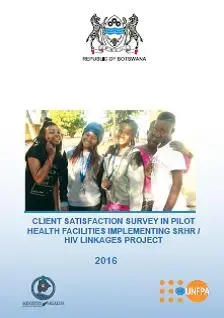The Government of Botswana (GoB) is advocating for implementation of SRHR/HIV linkages services. This approach will lead to reduction in missed opportunities, reduction in number of visits to health care facilities and ultimately improved health outcomes and client and health care worker satisfaction. The Government of Botswana’s decision is also supported of the Second National Strategic Plan for HIV and AIDS (2010-2016). In light of this, a Client Satisfaction Survey (CSS) in nine selected pilot health facilities implementing SRH/HIV services was commissioned in order to establish the level of client satisfaction and the quality of service being delivered before rolling out the intervention to all the districts of the country.
A non-experimental, cross-sectional descriptive survey at each of the nine SRHR/HIV health facilities in the three pilot districts (Mahalapye, Kweneng West and Kgatleng) was conducted through user exit surveys at the point of service delivery. Clients were services they received at the health facilities. The clients welcomed the approach of integration because they felt it reduced the number of trips to health facility. Although the (IEC) materials they found at the facilities, they were concerned with the long waiting time. The service providers were taking more time with clients due to the integrated nature of facility. Clients visiting all the pilot facilities (kiosk, supermarket or mall model) were equally Clients are still self-stigmatized as the reported that they would feel embarrassed to talk about HIV with a service provider of the same village/neighborhood. Although clients were concerned with stigma, the service providers felt that integration would decrease providers and clients appear to welcome integration and appreciate the advantages and convenience to the client of a ‘one-stop’ service. However, there is need to address issues health care workers through education. If these challenges are addressed, issues of workload and waiting time will be resolved. The lessons learnt from the integration of SRH and HIV services will motivate the Government of Botswana to scale up services nationwide. Through SRH/HIV, it has been demonstrated that goals on increased access to family planning services, prevention of unintended pregnancies in PLHIV, and joint delivery of family planning commodities and ARVs can be achieved. In the long term, health and community systems will be strengthened, and HIV prevention amongst the general population will be realized. The client satisfaction survey has indicated that for integration to be successful there is need to address the drawbacks of insufficient health facility space, increased staff workload and waiting times. Furthermore, whilst service providers at facility level have demonstrated high knowledge levels and skills to implement integrated SRH and HIV, the shortage of healthcare workers will need to be addressed, together with other factors that motivate them. The results of the survey are of special interest because Botswana has taken a decision to scale up the provision of integrated SRH and HIV services countrywide within the
limitations of integrated services should be of direct relevance to other districts in health problems.


